Niraj Lal says in this account of the origins of WikiLeaks that there is seldom any focus on the formidable concept of surveillance applied to structural power.
By Niraj Lal
Medium
“There is not a crime, there is not a dodge, there is not a trick, there is not a swindle, there is not a vice which does not live by secrecy.” — Joseph Pulitzer
 The last dinner that Julian Assange had in relative freedom, June 18, 2012, was takeaway pizza and cheap red wine with a couple of the WikiLeaks team and myself in a small flat in London, discussing possible trajectories of American politics for the coming decade. The next morning he walked into the Ecuadorian embassy to claim political asylum; he hasn’t seen sunlight unguarded since.
The last dinner that Julian Assange had in relative freedom, June 18, 2012, was takeaway pizza and cheap red wine with a couple of the WikiLeaks team and myself in a small flat in London, discussing possible trajectories of American politics for the coming decade. The next morning he walked into the Ecuadorian embassy to claim political asylum; he hasn’t seen sunlight unguarded since.
I first met Julian in the Redmond Barry Physics Lecture Theatre 10 years earlier, in 2002, on our first day at the University of Melbourne. The lecturer, the affable Professor Geoff Opat with curly hair and thick-rimmed glasses, in that first hour transformed the topic of “units” — of length, time and mass — into the powerful concept of “dimensional analysis,” a method of answering physics problems simply by determining the underlying units involved. It was a technique later applied to understanding structural opposition to government transparency.
Julian took two other subjects in addition to physics that first semester of 2002 — advanced maths and a first-year philosophy course titled “Critical Thinking — the Art of Reasoning.” We shared all three classes, but it was during a lunchtime discussion after the philosophy course, sitting on the sandstone steps of Melbourne Uni’s Old Quad, that I first heard him speak about the application of critical thinking to political questions.
He was working on a project he called “Rubberhose Cryptography,” a method to allow anyone with valuable digital information to have “plausible deniability” of not having it if someone was standing behind them with a length of thick rubber hose.
Julian asked the question: if a journalist with leaked information stored on a USB thumb drive was being interrogated about its contents by a foreign intelligence agency, is there a way that cryptography could enable the journalist to not surrender it? Even if the intelligence agency were using a thick rubber hose to beat it out of them?
The answer, of course, is that agencies have varied means of extracting information that are almost always successful given enough time; rubber hoses are only a crude initial measure before more persuasive techniques can be employed.
But Julian found that cryptography can have a role in supporting resistance. Rubberhose Cryptography formed the kernel of TrueCrypt — a program where folders on a drive can be protected by a password, but where the folders are themselves able to contain hidden folders which are only revealed by another password — but where (and here’s the kicker) there isn’t a way of determining whether all folders have been uncovered.
Such a program allows the possibility of “plausible deniability” — where a journalist could reveal one password to a small portion of sensitive information with it being plausible (and unverifiable) that that was all she had to reveal (even if the folder were hiding much larger amounts of sensitive information).
Rubberhose and subsequently Truecrypt formed the basis of On-The-Fly-Encryption programs that are used by intelligence communities around the world to this day.
At the end of 2002 two things happened: the Western world turned out for the largest protests in a generation against the War on Iraq, and the Melbourne Physics Students Society travelled to Ceduna in remote South Australia to witness the once-in-a-lifetime physical phenomena of a total solar eclipse that was to arc through that town in its brief traverse across Australia.
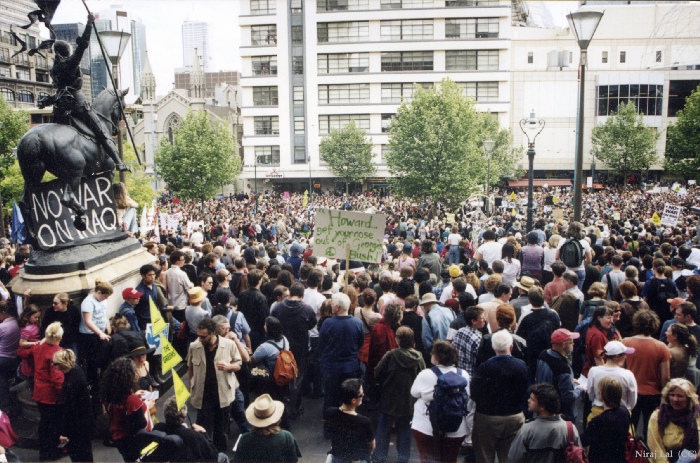
Iraq War protests, State Library of Victoria, Australia. (Niraj Lal)
The protests brought millions of Australians from all walks of life and all political persuasions onto the streets across the country to protest against the tenuous link between Al-Qaeda and Iraq, Weapons of Mass Destruction, and the continuation of George H.W. Bush’s agenda by his son, aided willingly by Australia’s newly elected Prime Minister John Howard.
The initial euphoria of protester solidarity would turn later to cynicism about regular civic engagement. If a million marching Australians couldn’t halt a nation going to an illegal war, what could?
Julian and a handful of maths and physics students would later apply their freshly learnt skills in critical thinking to try to figure out an answer.
If the protests were undeniably worldly, the solar eclipse on the other hand was decidedly other-worldly.
In a road-trip convoy organised by the Melbourne Uni Physics Students Society, 30-odd university physics students bumped and farted their way from Parkville, across the Great Ocean Road, past Adelaide to the small country town of Ceduna, through which the eclipse’s “arc-of-totality” would traverse.
Julian, myself and three other first-year students crammed into an old red Toyota Camry station-wagon, listening to a mix of 90s rock and Julian’s eclectic mix that introduced us to the tunes of Tom Lehrer, Monty Python (the Galaxy Song), and a quaint North American choir that sang about “Ampere’s Law of Electromagnetism” which we had just found out we’d be studying in second-year physics. We were a bunch of nerds on a summer roadtrip, having a blast.
A total eclipse is one of the sights of our planet — an all-too-fleeting study in stillness and a profound reminder that we really are all just “ghosts driving meat-covered skeletons made of stardust riding a rock hurtling through space.”

Total solar eclipse. (Mathew Schwartz on Unsplash)
Both events were perhaps studies in the unalterable trajectories of structural movement that humans aren’t able to derail from their predetermined courses.
In 2004 Julian competed in the inaugural Australian National Physics Competition held at the ANU where I was now studying.
He stayed with me with his girlfriend at the time, a mathematics PhD student at the ANU, and he mentioned that in addition to physics and maths he was learning neuroscience and the emerging empirical analytical tools being applied to explore the physiological underpinnings of consciousness, as well as exploring practical examples of cryptography for journalism.
In 2005 I received a broadcast email from him outlining the idea behind WikiLeaks. It was clear even then that a revolutionary idea had been born.
Present-day analysis of WikiLeaks often centers around political influence, Russia, U.S. President Donald Trump, former Secretary of State Hillary Clinton and the 2016 U.S. presidential election.
Articles about Julian typically center around the Swedish allegations now cancelled, the geopolitics of his incarceration, the substance of the U.S. Grand Jury indictments, or the legality of U.K. extradition.
But seldom do they focus on Julian’s idea behind Wikileaks — not just the leaks themselves and the changes they have swept before them, but the formidable concept of surveillance being applied to structural power.
This article aims to help address this imbalance, providing some personal perspectives on Julian as a thinker, his motivation for harnessing the tools of cryptography for the strength of the Fourth Estate, and his profound achievements in shining light on structural influence in the 21st century.
If the analysis of the possible U.K. extradition is what you’re after, the Open Letter from Lawyers for Assange is an excellent start.
For analysis of the steadily building Australian support, the Parliamentary Friends of Julian Assange led by Andrew Wilkie MP comprising 24 members of parliament (including Barnaby Joyce and George Christensen) has detailed information.
Applied Transparency
This piece instead focuses on the concept of transparency being applied proportionally to structural power. And the battle is finally coming to a head. No longer can the discussion of Julian or WikiLeaks hide behind anything other than the persecution of press freedom, and the fear of institutional unethical behaviour being exposed for what it is.
“To destroy this invisible government, to befoul the unholy alliance between corrupt business and corrupt politics is the first task of the statesmanship of the day”
Theodore Roosevelt wrote in his autobiography in 1913. One hundred years hence, the task is still before us.
Julian argued that the greatest achievement of WikiLeaks isn’t the exposure of 15,000 unreported civilian deaths in Iraq. Nor the corruption in Kenya, India, Saudi Arabia, Pakistan, Yemen, and countless countries around the world. Nor the exposure of the Church of Scientology, or the British National Party, or Stephen Conroy’s Internet filter, or the behaviour of Barclays, Kaupthing and the Julius Baer Bank. Nor the documentation of generations of global political fealty to the U.S. State Department. Nor the exposure of vast privatized surveillance across continents.
Instead, the greatest achievement of WikiLeaks is to shine the spotlight of surveillance on those who wield structural power. To help make a world where people who do wrong in the public’s name, get found out. To make governments of the future pause before they commit to the unethical, illegal or unconstitutional. To make those who would commit acts of atrocity consider the possibility of future exposure. Who polices the police? It must be the policed.
“No longer a government by free opinion, no longer a government by conviction and the vote of the majority, but a government by the opinion and the duress of small groups of dominant men.”
Wrote Woodrow Wilson, the 28th president of the United States of America, in 1914. But the nature of this domination has been obscured and forgotten over time, hidden and justified through the steady integration of business interests with the fabric of the national conversation.
Recent Australian examples of this integration include the former Minister for Defence Brendan Nelson allowing arms manufacturer sponsorship of the Australian War Memorial before accepting a position as Boeing adviser; the former Minister for Energy and Resources Martin Ferguson’s appointment as the advisory board chair for the Australian Petroleum Production and Exploration Association; and former Prime Minister Tony Abbott being appointed as an adviser to the U.K.’s Board of Trade.
It is a curious phenomenon that whilst there is significant pushback in the setting up of a national Independent Commission Against Corruption in Australia, and unprecedented attacks on whistleblowers in all fields from the military to the corporate governance to finance, there is at the same time an extraordinary increase in surveillance of our own lives.
Edward Snowden, who revealed the astonishing global surveillance being conducted by the five-eyes intelligence alliance among the U.K., U.S., Canada, New Zealand and Australia, writes about this phenomena succinctly:
“Saying that you don’t believe in privacy because you have nothing to hide is like saying you don’t believe in free speech because you have nothing to say”.
Acceptance of surveillance means thinking that no one should ever have anything to legitimately hide from our government — not journalists, or judges, or politicians, or lovers, or children, or even the police themselves.
Seven years after Snowden’s revelations, the U.S. Court of Appeals for the Ninth Circuit determined the warrantless telephone dragnet program that secretly collected millions of Americans’ telephone records violated the U.S. Foreign Intelligence Surveillance Act and may well have been unconstitutional.
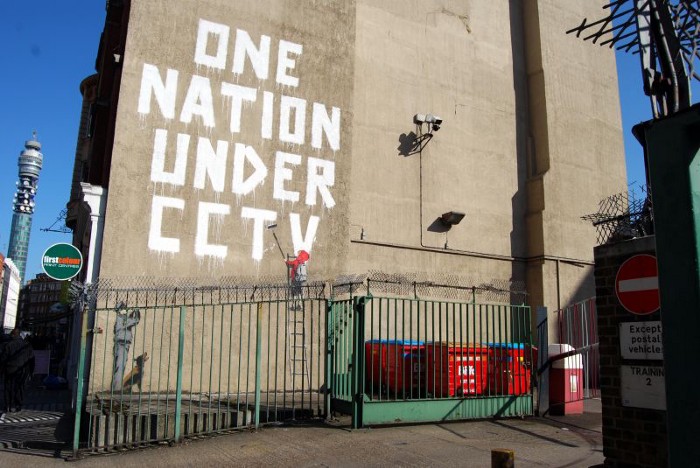
Wall message by Banksy. (oogiboog, CC-BY-SA)
Julian, Edward and the cypherpunk community more broadly argue that it isn’t love letters that should be surveilled, nor Facebook posts, nor family phone calls, but the decisions to go to illegal wars, the conversations to negotiate free trade agreements that are anything but, the analysis that leads to foreign bases on Australian soil, and the billion dollar deals between governments and arms manufacturers for military equipment that we questionably need.
It is worth pausing to consider the equivalent surveillance we are under today, 40 years ago would have been:
Australia Post postmen steaming open our every envelope at the post office, photocopying it, keeping it on file (in case we commit a future crime) and resealing it for forwarding. Telecom Australia placing bugs on our phones and recording our every call. Every street-directory recording every direction you have ever searched for. Every shop assistant recording our every purchase, just in case a future intelligence agency would like to look at it. All without judicial oversight.
Would we have allowed this in a world without the internet? Does our use of the internet mean we must resign to this surveillance? It needn’t be so. Certainly not without increased scrutiny of those who watch us, commit our men and women to war, and spend our taxes. WikiLeaks provided a way to shove the pendulum of surveillance the other way.
Donald Rumsfeld, the former U.S. secretary of defense, confuddled us in 2002 about the “known knowns” — (things on Wikipedia), and the “known-unknowns” — (university research). But it’s the category of the “unknown knowns” that we don’t have visibility over and that society perhaps should.
These are the things that some know but not all, restricted information meant to be hidden, and the things we have forgotten. A large portion of this information is concealed by classification and secrecy, or drowned through the torrent of commercial television. But it is lucky that we have institutions dedicated to exposing that information which is in the broader public good.
WikiLeaks shouldn’t have been as revolutionary idea as it was. The role it plays is what journalism should do as a matter of course. That it created such a stir is a statement of the paucity of current media.
But the idea behind WikiLeaks is an idea that can’t be stopped. Most major news organizations have now each implemented their own version of WikiLeaks’ “Secure Drop Box” — digital equivalents of the ability to leave a grey envelope on a park bench. But whilst these techniques are new, the principles behind them are old:
“For whatever is hidden is meant to be disclosed, and whatever is concealed is meant to be brought out into the open.” – Mark 4:22
A lack of transparency results in distrust and a deep sense of insecurity. – The 14th Dalai Lama
In 2009, as I completed my PhD in physics at the Cavendish Laboratory at Cambridge, and WikiLeaks released “The Afghan War Diary” and the “Public Library of Democracy,” I stayed with Julian at Ellingham Hall in Norfolk where he was under house arrest awaiting questioning from Swedish authorities on the accusations of two women.
I’m not sure if I have any place as a man in discussing sexual misconduct allegations by a woman against a man. In the years hence I’ve had a daughter, accompanied by a growing awareness of the structural power of the patriarchy that this brings. But the statement of the UN special rapporteur on torture, Professor Nils Melzer, human rights chair at the Geneva Academy of International Humanitarian Law, should make us question whether other institutionalised power structures are at question:
“I have never seen a comparable case. Anyone can trigger a preliminary investigation against anyone else by simply going to the police and accusing the other person of a crime. The Swedish authorities, though, were never interested in testimony from Assange. They intentionally left him in limbo.”
“And of the complainant: while still in the police station, she wrote a text message to a friend saying that she didn’t want to incriminate Assange, that she just wanted him to take an HIV test, but the police were apparently interested in «getting their hands on him.» The police wrote down her statement and immediately informed public prosecutors. … two hours later, a headline appeared on the front page of Expressen, a Swedish tabloid, saying that Julian Assange was suspected of having committed two rapes.”
“I speak fluent Swedish and was thus able to read all of the original documents. I could hardly believe my eyes: According to the testimony of the woman in question, a rape had never even taken place at all. And not only that: The woman’s testimony was later changed by the Stockholm police without her involvement in order to somehow make it sound like a possible rape. I have all the documents in my possession, the emails, the text messages.” [1]
“In the end it finally dawned on me that I had been blinded by propaganda, and that Assange had been systematically slandered to divert attention from the crimes he exposed. Once he had been dehumanized through isolation, ridicule and shame, just like the witches we used to burn at the stake, it was easy to deprive him of his most fundamental rights without provoking public outrage worldwide.[2]
— UN Special Rapporteur on Torture, Professor Nils Melzer, Human Rights Chair at the Geneva Academy of International Humanitarian Law
The Swedish allegations have lapsed and have not been renewed. It is a shame for all involved that they will never be heard, for both the women and for Julian. The formal Agreed Facts of the Case and testimonies are available online if of interest [3], but Julian is now in custody for the sole reason that the USA has requested his extradition from the U.K.
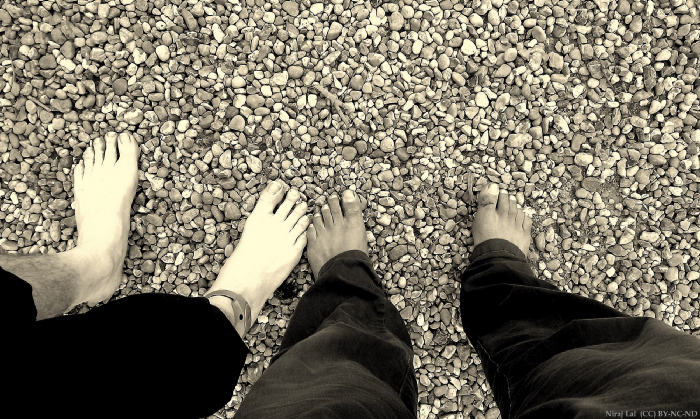
House arrest at Ellingham Hall, U.K., 2011. (Niraj Lal)
The Norfolk period of house arrest was painful for Julian; he was forced to wear a manacle around his ankle and report to the nearest police station every morning by 10am, but it wasn’t without its own restricted freedoms. In July 2011 he held his 40th birthday party at Ellingham Hall — my jazz band played music for it, and it was attended by many supporters of his, some famous, some secretive — all conscious of the grand struggle at play between a journalist determined to expose the ugly truths of structural power and the vast machinery of the US military.
We kept in touch through his house arrest, embassy stay, and later through the Founding National Council of the Australian Wikileaks Party — the attempt to get Julian elected to the Australian Senate in 2013.
The attempt failed spectacularly, in no small part due to the difficulties in leading and organising a fledgling political party remotely (in the pre-Covid days before we all became used to Zoom meetings). But the story continued.
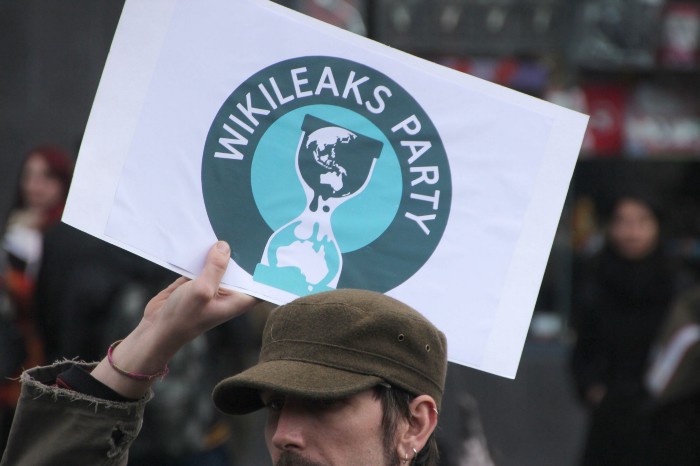
Refugee and asylum seeker rights rally, Melbourne, July 2013. (Takver, CC-BY-SA)
Julian moved from Ellingham, and the U.S. government generated a grand jury indictment against him. On the morning of June 19, 2012, Julian sought, and was granted, asylum in the Ecuadorian embassy by President Rafael Correa, who was strongly supportive of WikiLeaks’ work in exposing American influence in South America, and one of the more appreciative national leaders Julian interviewed in his TV series “The World Tomorrow” whilst under house arrest.
But Correa’s term ended, and in his place was the new President Lenín Moreno, more sympathetic to U.S. demands for expelling Julian, perhaps related to the subsequent awarding of more than $4 billion in multilateral aid from U.S. affiliated institutions [4], or the role of WikiLeaks in exposing the INA Papers that included details of Moreno’s secret accounts [5].
Julian’s diplomatic immunity was revoked by Ecuador on April 11, 2019, and British police were invited into the Embassy where they arrested Julian on breaching the Bail Act, sentencing him to 50 weeks in prison. That same day, the United States government finally unsealed an indictment from the Eastern District of Virginia against Julian for alleged computer intrusion related to the leaks provided by Chelsea Manning. On May 23, 2019, the United States government further charged Julian with violating the Espionage Act of 1917, revealing the end game of the battle, and the true challenge to press-freedom of the world.
The aim of the Espionage Act is “to punish acts of interference with the foreign relations, and the foreign commerce of the United States, to punish espionage, and better to enforce the criminal laws of the United States, and for other purposes.”
That an Australian journalist, publishing documents that reveal war crimes can be indicted on the U.S. Espionage Act, whilst not on U.S. soil, is a warning flag to the world.
If Julian Assange and WikiLeaks can be indicted under this act, so too can The Guardian, The New York Times and every media outlet that published any of the WikiLeaks cables, or will publish any U.S. document in the future.
Julian is Australia’s most internationally awarded journalist. Perhaps the world’s most awarded journalist of all time. Recipient of the 2011 Walkley Award for Most Outstanding Contribution to Journalism, 2008 The Economist New Media Award, 2009 Amnesty International UK Media Awards, 2010 Time Person of the Year, Reader’s Choice, 2010 Sam Adams Award, 2011 Sydney Peace Foundation Gold Medal, 2011, Martha Gellhorn Prize for Journalism, 2013 Yoko Ono Lennon Courage Award for the Arts, 2019 Gavin MacFadyen award, 2019 Catalan Dignity Prize, 2020 Stuttgart Peace Prize, and nominated seven times for the Nobel Peace Prize by members of European parliaments and past Nobel laureates.
The trial of Julian Assange places perhaps the world’s most decorated journalist against the most well-funded institution in the world. It will serve a test case for the might of structural power against press freedom. And it is likely structural power will win.
George Orwell once remarked: “the further a society drifts from the truth, the more it hates those who speak it.”
Julian will likely be extradited to the USA, and likely be convicted of either conspiracy to commit computer intrusion, or espionage, or both. Perhaps he will be able to return to Australia to serve his sentence here if convicted — as suggested by former Attorney General Nicola Roxon in 2012 “should Mr Assange be convicted of any offence in the United States and a sentence of imprisonment imposed, he may apply for an international prisoner transfer to Australia” [6].
Support for Julian in Australia is steadily growing. The cross-party Parliamentary Group of MPs led by Andrew Wilkie has brought together 24 federal MPs, including support against U.S. extradition from participants as unexpected as George Christiansen and Barnaby Joyce:
“If a person commits a crime in another country while they are there, they should be judged by those laws. If a person is residing in Australia and commits a crime in another country, I don’t believe that that is a position for extradition, If they weren’t actually there, if they weren’t present there, that is a question for Australian law.”
The petition to free Julian, penned by Phillip Adams, is the third-largest petition to be ever have been tabled in the Australian Parliament with over 500,000 signatories.[8]
But whilst we can write to our MPs and sign the petition, it is unlikely that this will stop the extraordinary legal precedent being established of the extradition and subsequent conviction of a non-American journalist to the USA for exposing U.S. war crimes.
Once extradited, it is likely that Julian will be found guilty by the United States District Court for the Eastern District of Virginia on the crime of “conspiracy to commit computer intrusion” and perhaps also espionage, an act that would place every woman, child and man in Western society under U.S. extraterritorial authoritarian rule.
The story of Julian, alongside the incredible and ongoing bravery of Chelsea Manning and Edward Snowden, are the stories of our generation. And we must not forget these personal sacrifices for our collective freedom.
Sign the petition, contact your MP in Australia or the U.K. if you’ve the time and energy to do so, but perhaps most effectively, share a moment of sorrow when a defender of human rights and press freedom is successfully silenced by the might of structural power.
“Most people, in the end, choose to lead safe, comfortable lives. We’re not interested in putting ourselves in the line of fire. Yet we owe a great debt to those people who do.” – Mary Kostakidis
The truth shall set you free. – John 8:32
Dr. Niraj Lal is a physicist and author based in Melbourne.
This article is from Medium.
The views expressed are solely those of the author and may or may not reflect those of Consortium News.
Contribute to Consortium News’
25th Anniversary Fall Fund Drive
Donate securely with
Click on ‘Return to PayPal’ here.
Or securely by credit card or check by clicking the red button: Click the button below to become a patron of our webcast CN Live!
Click the button below to become a patron of our webcast CN Live!

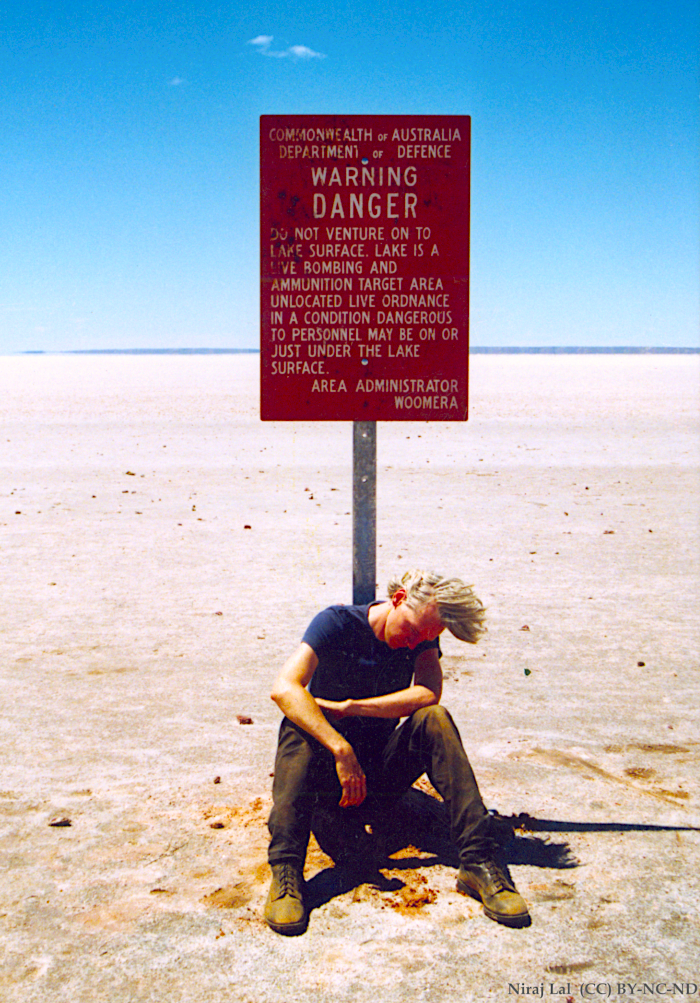
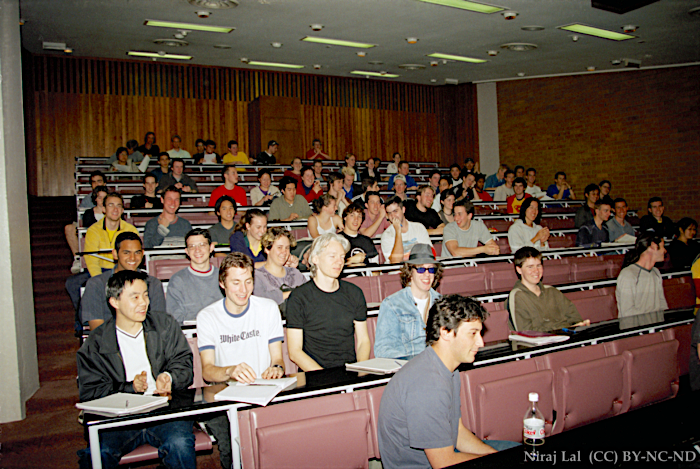
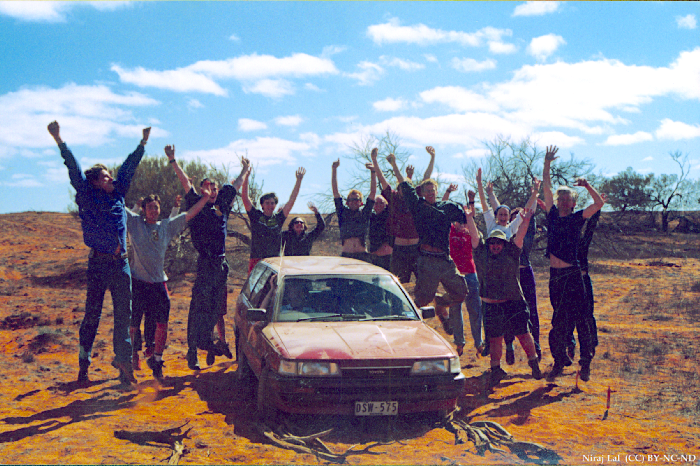


Thank’s so much to the author much for sharing this background story. I also have a background in Physics and computer science and I now understand more clearly what Julian wants to achieve. I now feel much closer to him and I feel pretty bad with what the U.S. is doing through the DOJ and the State Department with the tacit consent of it’s allies: that essentially amounts to the torture of a non US citizen just for exposing the U.S. bad doings. My heart is with Julian but that is not enough to save him from the inhumane monsters he appears to be facing. Physicists and Computer scientists around the world should stop providing tools to those who pursue domination in this world whatever the narrative is. Julian is truly a hero of this new millennium and he should be the one to be nominated for the Nobel peace prize.
“The greatest achievement of WikiLeaks is to shine the spotlight of surveillance on those who wield structural power. To help make a world where people who do wrong in the public’s name, get found out. To make governments of the future pause before they commit to the unethical, illegal or unconstitutional. To make those who would commit acts of atrocity consider the possibility of future exposure”.
THAT (the ability to hold those in positions of authority who abuse the public trust accountable) is what is at stake!
If Julian Assange can be treated as he has been NO ONE IS SAFE now and nor will anyone be safe in the future. Corruption and Abuse of Authority with IMPUNITY will prevail and the rest of use will have neither rights nor security in any aspect of our lives.
That is how serious the outcome of this scandalous abuse of Julian Assange really is.
And is why he must not only be exonerated of ALL wrong-doing and released but COMPENSATED for all the damages done as a result of the unlawful torture he has been subjected to, with those responsible punished severely.
Not a trivial task but nevertheless one that must be accomplished successfully.
Thank you Niraj Lal.
Very nicely done. What you have presented here is the perfect explanation of who the evil doers really are and the type of person and work that needs to be done to do correct the situation.
This man, Mr. Assange has presented the world’s population with nothing but positive information about how data can be used and misused. Your words here made it very clear to this old aging brain one thing that is being constantly overlooked because of petty gluttonous politicians and those who own them.
Julian is a man dedicated to reducing human suffering at the hands of evil doers and his ideas horrify those addicted to power.
Why in the name of all things that matter on this earth is he locked up and not working to help solve this planets seemingly unending myriad of serious problems.
No on on earth, not any one has any time to waste here. Let Julian go, set him free.
Thank you again Niraj and thanks to CN
It is heartbreaking to see the naivety of so many of my friends who still believe the mainstream media’s propaganda that Assange is a rapist, and worked with Russia to make Trump president, and therefore, deserves to be treated as he is being treated.
Sometimes I tend to lose my faith in the critical thinking ability of the populace. Thanks god, there are still people like Assange, and those who support him.
This was a very touching article. Thank-you.
I think the time for chatting on the web is drawing to a close, but I could be wrong about that. The time for serious direct-action is upon us – I think it needs to be world-wide, and I think it is already happening. I believe Julian would appreciate that sentiment. I believe most of us can feel it in our hearts – it might just be a twinge or a bit of doubt, but for some it is a flicker that will lead to a flame. A flame of justice is what I feel coming – let it be true.
I really appreciated the “Journalism of Julian…..” zoom call in all of its real-world humanity on an individual level – technical troubles and all. I have hope and I’m going to share it with others as best I can. But, please, none of us should be naive. Direct-action is not easy, but it gets results and that is what we need now! I advocate non-violence because I don’t see how peace can be achieved if it is not done peacefully.
Best to all during these uncertain times – I think critical mass is approaching, so I encourage all to plan ahead as much as you can. Store some rice (or equivalent) and maybe some water and share with your neighbors if they need help.
Peace,
BK
I couldn’t agree more. Only direct action has the potential to save Julian from extradition to the US. Dr. Lal seems to have resigned to Julian’s fate of being extradited to the U.S. I strongly disagree with this position. I don’t share this defeatist sentiment. And it is naive to believe that the USA would allow Julian to serve his sentence in Australia once convicted in the Eastern District of Virginia Courtroom, the espionage court. A life sentence for exposing war crimes is absurd & ridiculous on its face. No extradition to the USA! This is a fight that must be taken to the highest levels of the corrupt and incompetent oligarchy and ruling class.
“Personal side” not personal dude. The autocorrect feature caused this mischief. Sorry
Thank you for sharing a little bit of the personal dude of this great and courageous person. People like Assange are a rarity. He is a true hero.
Brilliant contextual summary for Julian, thank you Dr Niraj Lal
A measure of just how critical it is to expose and destroy the panopticon is the findings of a Brown Univ. study this past week on the numbers killed (800 thousand) and displaced (37 million) by the MidEast war. And that along with the excruciating martyrdom of Assange glaringly illumines the comprehensive corruption and ruthless criminality of the controlling elite.
Why are TPTB punishing Assange far beyond what is proportional to his actions, making the huge assumption that he was, in fact, guilty of breaking any laws? Effectively the better part of a decade in near isolation in a tiny cubicle in a Latin American embassy in London, which over time became openly hostile to him and sabotaged his legal and human rights. A couple years and counting in a British maximum security prison where he is now on trial in a kangaroo court as prologue to being shipped to the United States where is will undoubtedly be put on trial for his life, charged with espionage when his real actions were only those of a journalist speaking truth to power and exposing horrendous war crimes by the Exceptional World Power which has not been slowed down or impeded in any real way by Julian’s revelations.
If anything, Julian has only succeeded in stirring the ire of a hornet’s nest in Washington DC. The American people are not marching in the street or rioting like Social Justice Warriors in protest of his extreme treatment as thanks for the mere act of enlightening the masses. So, is he subjected to this abuse to dissuade other individuals of a like mind to refrain from attempting anything similar? Are Washington’s abuses directed at potential Chelsea Manning’s or Seth Rich’s? Young idealists who might be so indignant at government crimes against humanity that they might be tempted to put fifty or sixty years of a future comfortable life at risk? Could their repugnant actions be rather mostly directed at the powerhouse news agencies of the Guardian, the NYT, the WaPo or what is otherwise known as the establishment’s mouthpieces? How likely is that NOT the case? Or, are they going after the Russian international media, viz., RT and Sputnik, cluing them in that lost energy sales to the West will not be their only consequence of bucking the new world order that the hegemon demands? Or, in the final analysis, could it be that the tiny residuum of a free and independent press, represented by the likes of Consortium News, Information Clearing House, Counter Punch, and even their right wing or libertarian counterparts like Zero Hedge and Unz Review are the beasts that they really want to exterminate? Without these remaining organs of true resistance, the human race wouldn’t be hearing diddly about Mr. Assange, he would simply be disappeared. Maybe he’d be whacked by American Intel and the Russians roundly blamed for Novichoking him sans any evidence.
Brilliant analysis !°!
It’s interesting to read this personal account which decidedly contradicts the ugly picture that tabloid propaganda has painted of Mr. Assange.
Wonderful article Niraj. One of the best I’ve seen published on CN.
Excellent background info, excellent writing, and a jazz musician to boot!
Thank you Niraj Lal.